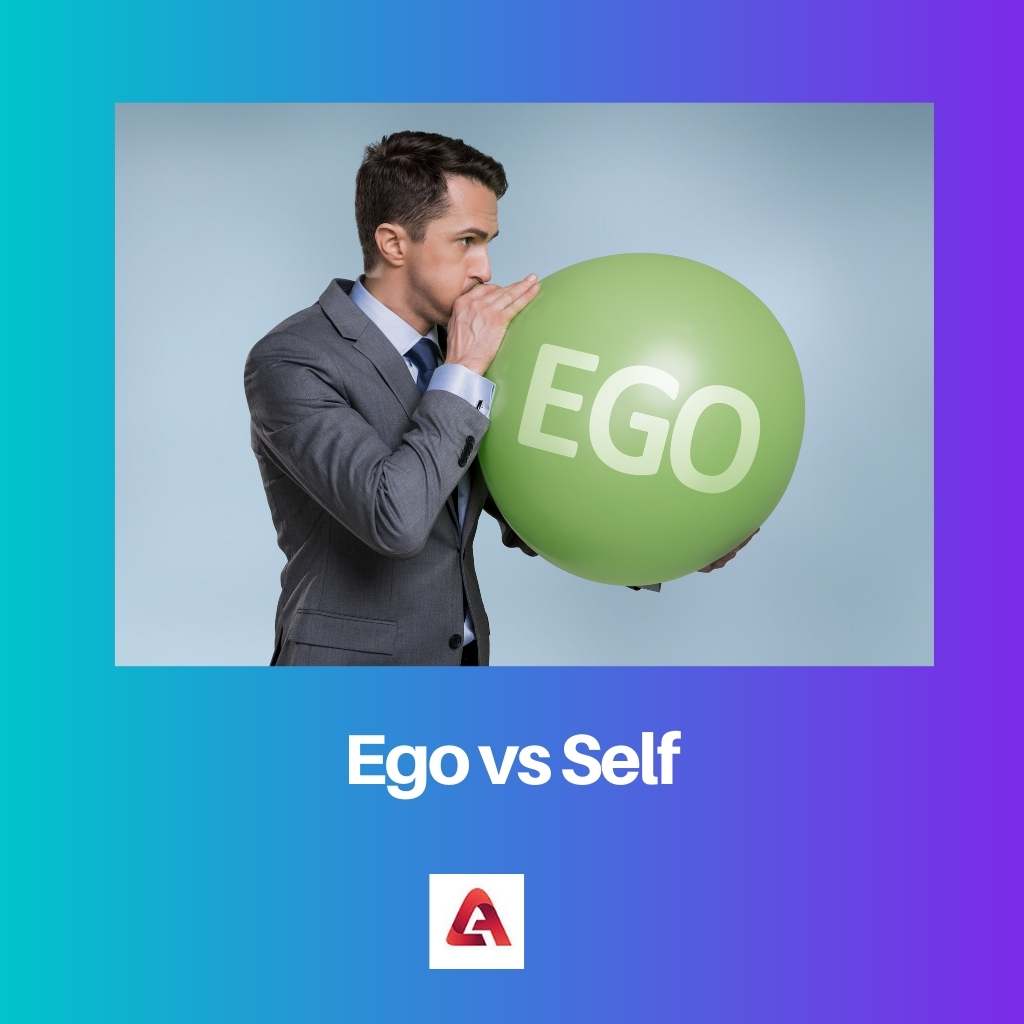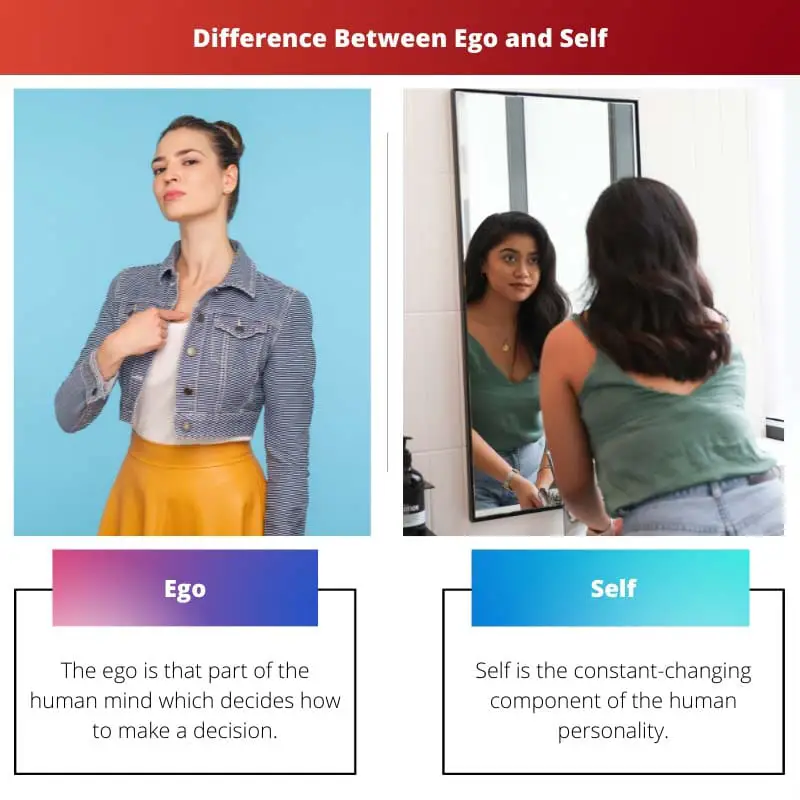Sigmund Freud is the most popular and known in the world of psychology. Though many of his theories have been rejected by modern psychology, his psychoanalytic theory still holds its importance.
According to him, every human mind can be divided into three levels: conscious, subconscious, and unconscious.
He has also defined the human personality into three sections- Id, Ego, and Superego. On the other hand, self refers to an individual’s perception of human behaviour, personality and capabilities.
Key Takeaways
- The ego is the psychological construct that mediates between the conscious and unconscious mind and helps individuals make sense of their experiences.
- Self refers to an individual’s overall identity, encompassing their thoughts, feelings, values, and beliefs.
- The ego can be a source of self-esteem and self-doubt, while the self represents a broader, more stable concept of personal identity.
Ego vs Self
The ego is part of the psyche that is responsible for a person’s sense of identity and self-esteem and is the conscious aspect of the self-being aware of personal feelings. The self is the totality of a person’s individuality, including both conscious and unconscious aspects of the psyche.

The Ego is one of the three key structures of the human personality, according to Freud. He identifies it as the inevitable part of the mind that keeps a balance between the id and superego.
The controller of our mind leads us in the right direction.
The self is almost like the reflection of an individual’s take on different things, his or her perceptions about himself or herself. It can both be positive and negative.
It cannot be the same for everybody. It is very unique to each personality. The self impacts an individual’s life in terms of his or her beliefs about relationships, society, culture and everything in general.
Comparison Table
| Parameters of Comparison | Ego | Self |
|---|---|---|
| Definition | The ego is that part of the human mind which decides how to make a decision. | Self is the constant-changing component of the human personality. |
| Types | There are no types. | It can either be positive or negative. |
| Stages | There are no stages. | But self has many stages- chilhood, middle childhood, adolescence and adulthood. |
| Change | The ego does not change with time. | The self is alterable with time and context. |
| Dimensions | The ego is one dimensional. | The self is multi-dimensional. |
What is Ego?
Sigmund Freud, the greatest psychologist of all time, has mentioned three parts of the human personality- Id, Superego and Ego.
According to Freud, the Ego comes in the third position to develop in a human. The Ego plays an important role in making decisions. The reality principle operates it.
The Ego tries to satisfy both the requirements of the Id and the Superego and hopes to strike a balance between them. It can also be said that the Ego is a part of the id.
The influence of the external world modifies it. It almost works like a mediator between the id and the external world.
Since Ego plays an essential role in deciding for the individual, it is driven by reason as compared to the id, which is unreasonable and chaotic.
The Ego considers different societal rules, norms, and etiquettes and dictates how to behave in society. It is a controlled form of the id and does not follow any concept, like good or bad.
The Ego is weak compared to the id, motivating the individual to take the right direction. Freud even used an analogy to describe the relationship between Ego and the id.
He said that while the id is a horse, the Ego is its rider. But when it fails to use the reality principle, the individual experiences anxiety. The Ego is a secondary process where the human mind is more rational, realistic and decisive.

What is Self?
The concept of the self in an individual refers to his or her ideas, beliefs and notions about various things. The three elements of the self are self-image, self-esteem and self-confidence.
The first element restores impressions of various things and our self in our mind, whereas self-esteem refers to the individual’s feelings about his or her self.
Self-confidence is nothing but an estimation of how much we believe in ourselves. In a nutshell, the self-concept is the collection of the individual’s perceptions, feelings and confidence.
This concept is important because many people struggle to socialize in public. This is very dynamic.
The concept of the self can help a person relate to the world better, and he or she will find happiness in the journey.
It also allows people to explore different areas and think about what they want to do with life and improve. But one may find congruity when self-concept is aligned with reality.
The concept of the self is very unique to each personality. Though it changes with time, context and external influences, it goes through three stages.
The first stage is for babies up to 2 years, the next stage comprises children from two to four years, and the last stage is for children of five and six years.
However, the self continues to develop and change in middle childhood, adolescence and adulthood.

Main Differences Between Ego and Self
- The Ego protects us from vulnerability. On the other hand, the self constantly puts us in debates.
- The Ego keeps us organized and satisfied, but the self always puts us in a state where we feel confused and demotivated.
- The Ego is dimensional, but the self is multi-dimensional. It projects our understanding of ourselves in terms of society, religion, emotions etc.
- The concept of Ego is inherent. It cannot be learned. But for the concept of the self, it can be learned. But it is not inherent.
- The Ego does not change over time, but the self changes with the context.


It’s important to critically evaluate Freud’s theories and acknowledge their impact on shaping modern psychological thought.
Freud’s concept of the mind is timeless and still holds value in modern psychology.
Sigmund Freud’s contributions to the understanding of the human mind are unparalleled.
While Freud’s theories have been influential in the field of psychology, his concepts lack empirical evidence to support them.
The Ego and Self are essential components of the human psyche, and Freud’s framework provides valuable insights into these constructs.
Freud’s theories are fascinating, but it’s crucial to approach them with a blend of skepticism and appreciation for their historical significance.